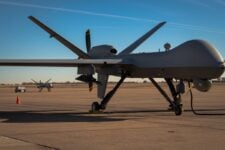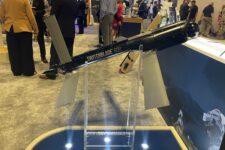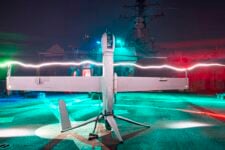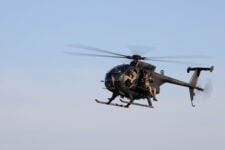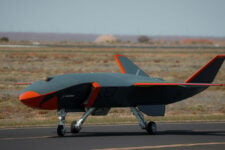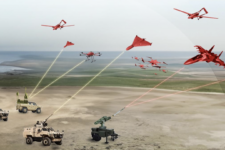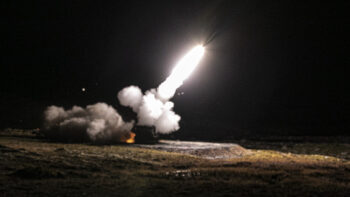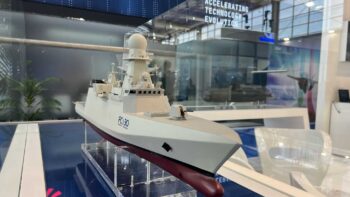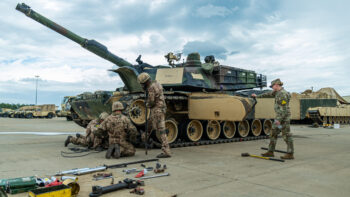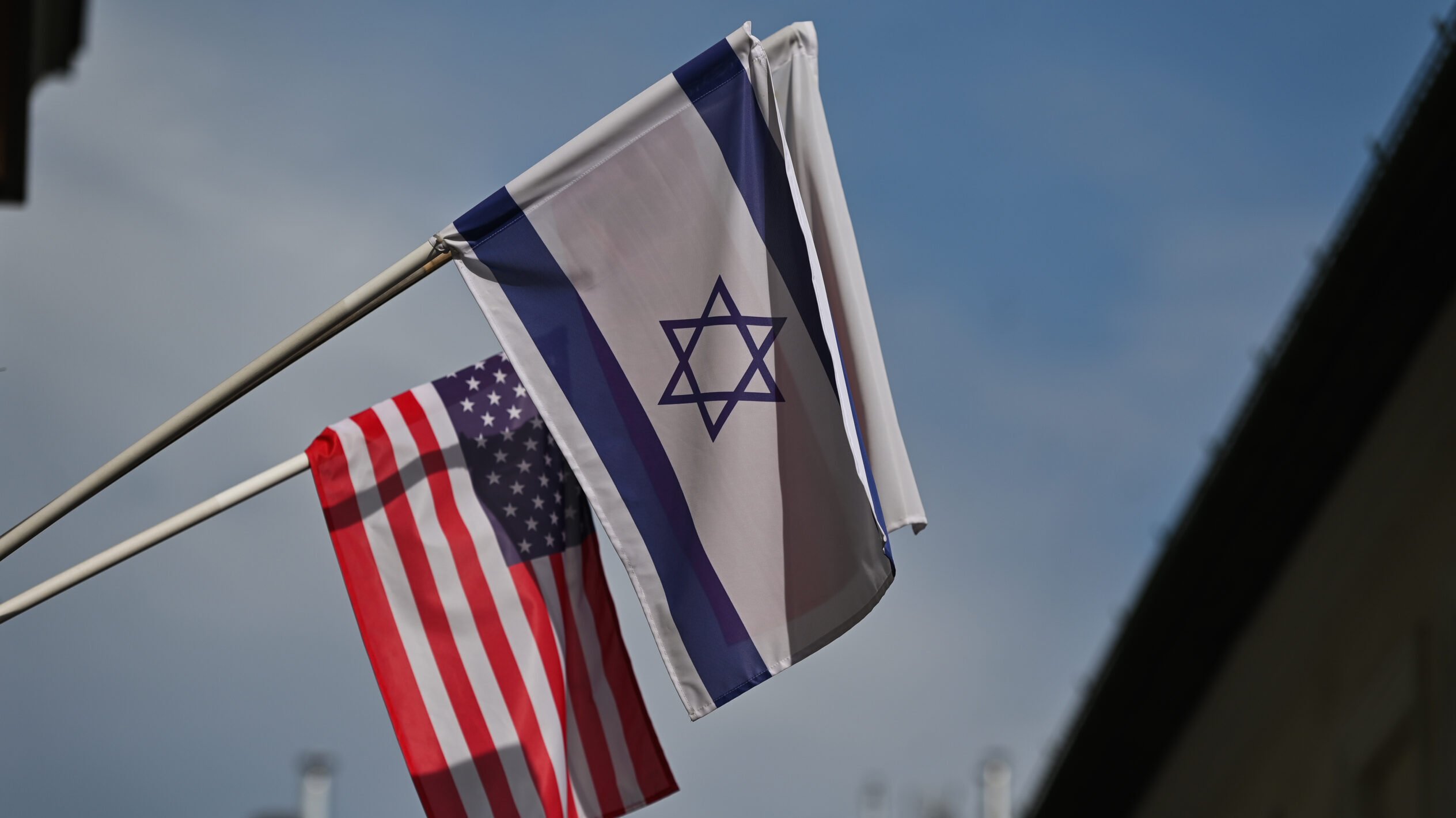
Israeli and U.S. flags seen August 28, 2022, in Krakow, Lesser Poland Voivodeship, Poland. (Artur Widak/NurPhoto via Getty Images)
WASHINGTON and JERUSALEM — During a media roundtable this morning, the Pentagon’s No. 2 official was asked about the Defense Department’s assistance for Israel. And while material concerns and reports of a potential ceasefire were touched on, Deputy Defense Secretary Kathleen Hicks also pointed to the importance of an inside baseball change to Israel’s relations to the US.
“We are seeing some of the benefits of having [US Central Command] CENTCOM looking both at defense of Israel issues and the overall picture in the region,” Hicks said at a Defense Writers Group breakfast in Washington. “So much of what we do in and around Middle East security is about working with our Arab partners and CENTCOM … bringing in the Israelis to that structure, I think has helped to broaden the picture.”
“In this crisis, at this time, I think that has been opportune: CENTCOM can help advise on the range of what is happening in the region,” she later added.
For those outside the defense community, the mention of Israel being in CENTCOM may not mean much. But analysts tell Breaking Defense that the relatively new status quo is an important move that has paid real geopolitical dividends for Israel in this moment of crisis.
RELATED: AFCENT working on anonymous threat data pool, to get around partner trust issues
For years, Israel fell under the operational purview of US European Command (EUCOM) while the rest of its neighbors fell under CENTCOM. It never made sense when looking at a map, but was reflective of geopolitical realities, with a number of key CENTCOM allies in ongoing rhetorical conflict with Israel’s existence. Having the CENTCOM commander able to talk to the Gulf nations without having to bring Israel in made everyone’s lives easier, even as backchannels between the sides existed.
But in the waning hours of the Trump administration, the decision was made to shift Israel over to CENTCOM as tensions between Israel and some of its neighbors began thawing and concerns rose about a potential violent conflict between Israel and Iran. By September 2021, the Biden administration followed through with implementation, even as resources for CENTCOM were pared back in favor of first the Indo-Pacific region and then the conflict in Ukraine.
Whether that shift was simply a good bit of housekeeping, or if it came with real-world implications, had been hard to see from the outside given the relative stability of the region. Now, the impact of the change can be clearly seen, experts both in the US and Israel say.
Intelligence And Coordination
The most obvious way that shifting from EUCOM to CENTCOM is having an impact would be in the field.
Speaking to reporters on Oct. 31, Israel Defense Forces spokesperson Rear Adm. Daniel Hagari emphasized those benefits, saying, “We are working in coordination with the US military, with CENTCOM. Israel’s transition to CENTCOM two years ago has significantly proven itself. We have developed an infrastructure base for transfer of data, intelligence, joint aerial operations with CENTCOM and operations with the 5th fleet.”
Mick Mulroy, the former US deputy assistant secretary of defense for the Middle East from 2017 until 2019 and currently a senior fellow with the Middle East Institute, said the evolving Hamas-Israel situation shows that it was the “correct decision” and gives one chain of command authority and operational control, especially if the war expands.
“Israel’s primary area of concern (other than Gaza) is Lebanon and Syria,” Mulroy wrote last week in a message to Breaking Defense. “The US has bases and personnel in Syria. Coordinating combat operations in this area is complex and imperative. That coordination is more streamlined.”
As the situation in the Middle East continues unfolding, Director of the Defense and Security Program at the Middle East Institute Bilal Saab said Israel’s “incredible” portfolio of capabilities will be an asset for CENTCOM, but noted challenges may await.
Eran Lerman, a former deputy national security advisor to the Prime Minister and vice-president of the Jerusalem Institute for Strategy and Security, said that the US was just as surprised by the Oct. 7 attacks as the IDF, meaning intel sharing needs to be improved between the sides – something easier if Israel reports to CENTCOM than EUCOM.
“I think we are offering some lessons in close cooperation of ground, air and tactical intelligence working together in a fairly impressive manner,” Lerman said on Nov. 13.
Lerman noted how Washington has been quick to ramp up its presence in the Middle East over the past six weeks, decisions that have included additional troops, and moving the USS Gerald R. Ford Carrier Strike Group and the USS Dwight D. Eisenhower Carrier Strike Group into the region. The US also quickly began delivering weapons to Israel, a stark contrast, he said, to how Operation Nickel Grass, the 1973 airlift to support Israel, got off the ground.
Again, having Israel in CENTCOM could make coordination of moving some assets into the region easier. But the greater impact of the CENTCOM shift may be not on the battlefield, but behind it.

This image grab from an AFP TV footage shows balls of fire and smoke rising above Gaza City during an Israeli strike on October 27, 2023, as battles between Israel and the Palestinian Hamas movement continue. (YOUSEF HASSOUNA/AFP via Getty Images)
Geopolitical Relations Through CENTCOM
Jonathan Lord, director of the MIddle East Security program at the Center for a New American Security, noted that the Gaza war is coming after several efforts for a more cohesive regional security have been underway, including the expansion of the Abraham Accords, the Israeli-US Juniper Oak live-fire exercise and plans for a Middle East Air Defense Alliance (MEAD).
“Frankly, it’s been a lot of that work, which has been the underpinning of … the movement of the tectonic plates in the region that we’ve seen,” Lord told Breaking Defense last week. “Perhaps [that] contributed to Hamas’s reason for seeking to launch the attack that it did was to disrupt Israel’s increasing integration into the region, both politically, diplomatically, economically, and from a security perspective.”
Amos Gilead, who served as head of research for IDF military intelligence and director of policy and political-military affairs at the Ministry of Defense, said he believes the decision to place Israel under the CENTCOM structure demonstrates the “unique importance of the alliance” between Israel and Arab countries.
“It means we can cooperate together with the Sunni Arab countries under the US flag against the axis of evil led by Iran and other enemies,” Gilead told Breaking Defense on Monday.
“Today, working with the main forces of the Middle East is like [working as part of] a pax Americana regime,” he later added.
While the war is still in the early days, Gilead said that right now he doesn’t predict it having a negative impact on Israel’s role in CENTCOM.
“After the defeat of Hamas it will pave the way for enhancement and cementing ties with CENTCOM and all strategic alliances between Israel and Arab countries and pave the way for reconstruction of Gaza,” he added.
But Yoel Guzansky, a senior researcher at the Israel-based Institute for National Security Studies (INSS) specializing in Gulf politics and security, pointed to those budding relationships as potential points of contention.
For example, Israel and Saudi Arabia have not yet normalized their diplomatic relationship but each one’s actions impact the other. He warned that the ceasefire in Yemen between the Saudi-backed government and the Houthis could be jeopardized if the war in Gaza expands, sending ripple waves across the region. And being in CENTCOM instead of EUCOM means there is no veil of a buffer where the CENTCOM leads can claim to be hands off with Israel, putting more pressure on the team led by Gen. Erik Kurilla.
“Obviously, you don’t really have to be part of the [area of responsibility] AOR officially to cause problems for CENTCOM but now that it’s really under your official responsibility, then it becomes your problem: You own the problems that Israel is going to cause for you,” Saab warned, noting that Israel can be “trigger happy” at times.
Saab also pointed to a potential lurking conflict about the EUCOM/CENTCOM switch, as the US tries to figure out how to support both Ukraine and Israel.
“You have to allocate and find more resources in order to incorporate that new opportunity/problem into your operations,” Saab said. “Anytime you’re asking for more resources, it’s going to be a food fight with the other geographic combatant commands, especially at a time in a strategic environment where more resources are leaving the Middle East and going to the Indo Pacific.”
Taking aim: Army leaders ponder mix of precision munitions vs conventional
Three four-star US Army generals this week weighed in with their opinions about finding the right balance between conventional and high-tech munitions – but the answers aren’t easy.


